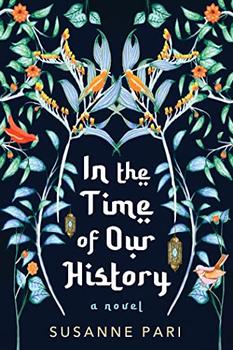Summary | Excerpt | Reading Guide | Reviews | Beyond the Book | Readalikes | Genres & Themes | Author Bio

Anahita had been three years behind Mitra in school. The first day of third grade—Ana's first day of kindergarten—Ana ducked under Miss Callahan's outstretched arm, ran straight for the third-grade class lining up in the hallway, and tried to hug her sister. Mitra gritted her teeth and pushed Ana away. "Go back to your class!" And later, on the school bus: "You sit in the front and I sit in the back. And don't come up to me at school!"
Anahita had obeyed, as she always did. Not once after the first day did she look toward Mitra. Not when she was teased and taunted for her frizzy hair, not even when she broke her arm falling from the slide. Not until Ana was twelve, when suddenly everything changed between them, when it was too late for Mitra to expunge those callous acts, at least not in her own mind.
Mitra startled as the gymnasium door burst open and regurgitated a gaggle of exuberant children. She stood, gathered her purse, and noticed a metal plaque screwed into a lower slat of the bench:
Nikku & Nina—Gone Too Soon
Eyes stinging, careful not to stumble, she headed for the car.
The old residential part of Devon had experienced a madness of boomer remodeling, what Mitra thought of as a reawakening of postwar nuclear family idealism. She made a K-turn and parked across the street from the bungalow Anahita and her husband once owned. After the accident, Bijan had taken a month's leave of absence from his bank job, spending most of it in bed reacquainting himself with his collection of bongs. The bank had finally honored his request for a transfer to their London office. Mitra had spoken to him once before he departed, a short conversation that left her feeling cold. She knew they might not talk again for a long while; he couldn't bear it. She missed him now, especially his Jimmy Stewart stutter and his dry jokes about impotent bankers.
She opened the window and lit a cigarette, promising herself to drive off when she finished it. A breeze whisked the smoke out the window. Sun glinted off the side mirror. She lifted her gaze to study the house.
Same, same—only different. Anahita would notice the film of dust on the black shutters and the faint brown spots on the lawn. She would hate that the wooden screen door had been replaced by a cheap metal one, that the front porch where she'd had Adirondack chairs and hanging plants was now a parking spot for two adult bicycles and a half-dead, left-leaning ficus.
Did the new owners know the sad story of their predecessors? They must, Mitra decided.
Neighborhoods owned the tragedies of their inhabitants. The new people were no doubt solid American white people, not immigrants like her parents who weighed every story for bad luck—and bought a different house.
Mitra turned the car off to hear suburbia: a distant lawnmower, barking dogs, a woodpecker knocking itself out on a telephone pole, the faraway chatter and laughter of the playground—sounds of her childhood, sounds Anahita loved and Mitra hated.
She broke her promise and lit another cigarette from the butt of the first one. Anahita would have scolded her; she'd never smoked, never done anything their parents would have disapproved of. Mitra's opposite.
A maroon minivan pulled into Anahita's ex-driveway, and a young woman in gray sweats jumped out, opened the back door, and reached in to tug a towheaded toddler out of the car. The child wore a pink sundress and white sandals. Mitra saw, even though she was too far away to see, each of the child's pink toes with their moon-shaped nail beds and pliant white cuticles. Her throat swelled. She turned the key in the ignition, turned it again, and the mechanism grated. With a jolt, she drove off.
She'd been holding her breath, it seemed. She was on the shoulder next to the golf course. Gasping, she inhaled the odor of fresh-cut grass and fertilizer. The digital clock on the dash read 9:15. She cursed herself for avoiding Libby and Nezam's apartment; she could have dropped her luggage off, taken a shower, skipped the tour of Devon altogether. A year goes by and you think you're strong, and then you're not. She rummaged for her cell phone and dialed her mother's number.
Excerpted from In the Time of Our History by Susanne Pari. Copyright © 2023 by Susanne Pari. Excerpted by permission of Kensington Publishing. All rights reserved. No part of this excerpt may be reproduced or reprinted without permission in writing from the publisher.
Your guide toexceptional books
BookBrowse seeks out and recommends the best in contemporary fiction and nonfiction—books that not only engage and entertain but also deepen our understanding of ourselves and the world around us.